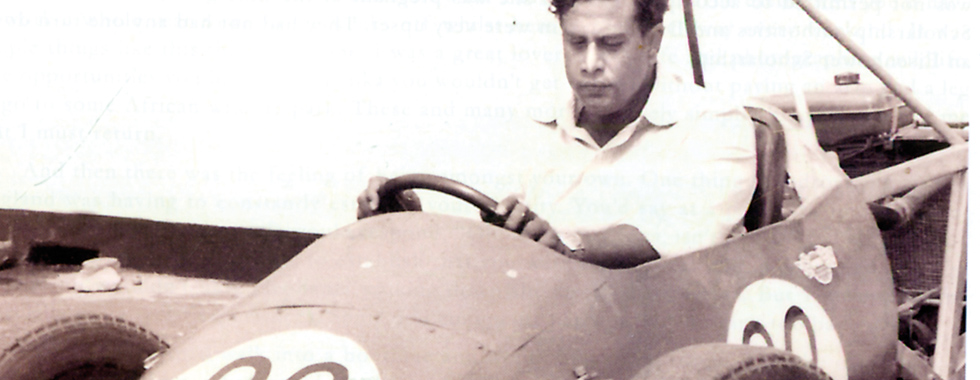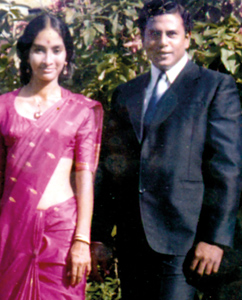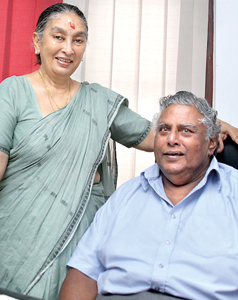Life wasn’t always on the fast track
The sleek, black Maserati stays parked outside the building while its owner attends an informal family meeting inside. The car doesn’t belong to Nihal Jinasena – though he’s had more than his share of beauties in his time. This one is his son Lalin’s vehicle of choice. This love for fast, beautiful things runs in the family. Nihal learned to drive from his father as Lalin learned from him. Even Nihal’s wife Sheryll has taken a turn behind the wheel of a race car. Unfortunately, her experience involved a wrecked car and a field of potato crops left devastated (she herself was unharmed) and it’s meant she’s wary of the sport. “From then on, I felt that any second you could have that crash,” she says.

The details of that story, one of several involving speeding machines, is included in Nihal’s newly launched memoir ‘My Chequered Life’. Writing in the early chapters, he speaks of his father T.S. Jinasena as a figure ‘larger than life.’Having once built his own racing car in his workshop Mr. Jinasena taught his 14-year-old son how to handle a vehicle with the same skill. These early memories, illustrated with pictures, form the first chapters of the book which then goes on to explore Nihal’s years in school followed by his time as a student in Loughborough University, UK. Other chapters are dedicated to his time as an engineer in the British firm Girling, his return to Sri Lanka and the success story of the Jinasena companies.
Explaining that he wasn’t keen initially to work on his autobiography, Nihal tells The Sunday Times, “It’s actually my wife and son who persuaded me to do it. It was intended to be a vehicle for me for not losing my marbles.” Retirement and a frightening bout with cancer had taken their toll, but Nihal found that working on the book with Ameena Hussein was an interesting process. “In the end I felt there was some message there that needed to be given to young Sri Lankans,” he says. “Cheating, lying, offering bribes – people feel you need to do all this to make it in life, but in the story that I’m telling we have scrupulously avoided these things, we have through honest hard work achieved position and wealth. It’s a message that gives hope that you can in fact succeed without compromising your morals.”
Pictures of Nihal from the Loughborough days capture a chiselled visage and a general air of determination. Mischievous yet intellectually precocious, he was reportedly a star student. His election to the post of President of the Student Union made him the first Sri Lankan to hold the prestigious post and won him a trip to Buckingham Palace where he met the Queen and her consort. Upon graduation he was recruited by Girlings where one of his posts was in the Forward Thinking Group who were involved then in ‘conceiving brakes for the future.’ Despite enjoying success after success at Girlings, Nihal was forced to confront the fact that he would never be entirely at home in England.
“You are never accepted as an Englishman, however hard you may try,” he says. While he found many lovely, kind people, the vast majority proved to be very insular. The contrast with Sri Lanka, where Nihal was very much in his own element, led him to return to work with his father in 1965. He found the company in bad shape. A bout of sickness had kept his father home and allowed employees to slack off. Handed the reins, he and brother literally set about reconstructing the company – labouring over the restoration of the Jinasena factory on Hunupitiya Road. Having inherited the determination to build pumps and motors of an outstanding quality, they persevered in the face of many challenges, eventually expanding into other businesses such as hospitality and garments.“We’ve been through some very hard times,” he says speaking of conflicts with the trade unions, the fallout from the JVP insurgency, times of shortages and cut backs, as well as the hits their hotel businesses took from the long conflict.
 Sheryll and Nihal: A pre-marriage picture |
 Through calm and stormy waters, still together. Pic by Indika Handuwala |
Through it all, Nihal held on to his vision for the company. “I’m a very self-confident person, I’ve never entertained a doubt that we were going in the right direction,” he says now.Less heartening are the family disagreements that eventually led to the division of the company’s portfolio. A family business that stood for 104 years had fractured, yet each element could stand alone. Coming under the newly formed Lalin Michael Jinasena Group of which Nihal is Chairman and Lalin CEO would be the company’s assets in hospitality, food and beverage, manufacturing and export, trading and web development, as well as projects like the boutique hotel Casa Colombo.
While a good chunk of the memoir is related to the twists and turns of his professional life, Nihal lingers over his relationship with his wife and with his son. He and Sheryll first met at the Yacht Club in 1974. (An accomplished sportsman, he holds records in both motor racing and sailing.) He confesses to having been bowled over by her beauty, and she says “the first time we met, I just knew it was him. You get that feeling.” He taught her to crew for him, and the two went on to become an unbeatable team out on the water. Soon after they were married, Sheryll became pregnant with Lalin. When their son was born, they were devastated to discover he was in less than perfect health. Lalin would undergo multiple surgeries, but he felt his parents stood behind him 100%.
“They took a position that they didn’t want me to feel sorry for myself or to feel like I was different,” Lalin says. Following his father into S. Thomas, Mount Lavinia, Lalin learned hard lessons on how stand up for himself and says he was the stronger for it. As an adult, he would need every ounce of that strength when he became the victim of a kidnapping. The kidnappers wanted a ransom of 5 million dollars but kept reducing their demands even as the threats escalated. Eventually two days later, worried that things were not going their way, the kidnappers released Lalin. “I was most worried about my father not so much for myself,” says Lalin. “It was an experience, I can tell you that. It was something that not only strengthened us, but showed us how strong we really were.” Sheryll stayed unshakeable. “I kept thinking of Lalin’s face,” she says. “I knew he’d come back safe.”
Having chronicled all these experiences in ‘My Chequered Life’, Nihal uses his last chapter to meditate on retirement and the blessings of a long and varied life. Having defeated a virulent cancer of the colon, he says he feels like he’s been given a second chance which he is determined to make use of. He writes in conclusion: ‘At this time of life I can look back and say that I can sleep with a clear conscience and that I am blessed with a loving family and wonderful friends who make my life fulfilled and happy…I am truly blessed.’
‘My Chequered Life’ by Nihal Jinasena is priced at Rs.4000. Proceeds from the sales of the book will go toward Ruhunu Sailing Association in Weligama. Formed in the wake of the tsunami, the association teaches young boys and girls to sail competitively, some of whom have even gone on to represent Sri Lanka.
comments powered by Disqus

